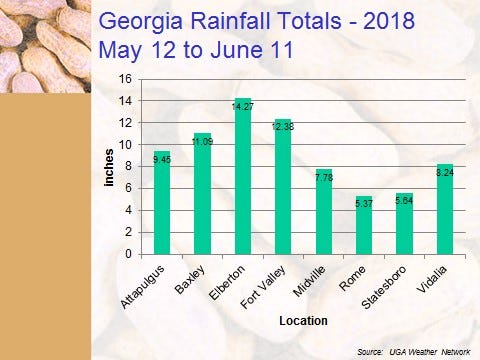June 13, 2018

Recently as I watched a torrential rainfall occur about 1.5 hours after I just applied 21 postemergence herbicide treatments in peanuts, I was reminded of one of my favorite songs titled “Rainy Days and Mondays (Always Get Me Down).
Ironically, this happened to me on Monday, June 11. It also reminded me of my college chemistry professor who ended each lecture with the following phrase: “This looks like a good place to punt.” I am certain many of my readers have felt this same way given the Abby-Normal rainfall patterns across the southeast. Check out Figure 1 for an update about rainfall totals in Georgia.
Since most weed management programs have been blown out of the water (literally), what can be done? Here are a few thoughts:
Sooner or later you will be able to get back in the field to get something done. Have a reasonable plan to attack your problems. In many cases, you will likely be able to get your foot in the field before a tractor. I heard someone once say that the best thing you can put in a field is your foot (or your county agents).
Although you may be tempted to do so, try not to solve every problem (weeds, insects, diseases, and fertility) with a single chemical application. I have said this before that when you tank-mix more than 2 to 3 things in a sprayer, much can go wrong and much is unknown.
If you missed the opportunity to apply a residual herbicide after planting, put one in with your previously planned POST treatments. Residual herbicides such as Dual Magnum, Outlook, Warrant, and Zidua can be tank-mixed with many POST herbicides in several crops.
Pop-up or surprise showers have been common. Thus, pay close attention to rain-free periods. These can usually be found on the herbicide label and/or in most university weed control guides. Avoid herbicide applications when rainfall is eminent or likely before these rain-free times. If you know a reliable weather forecaster, please let me know. They sure are wrong a lot!
Plants growing under cloudy conditions for an extended period of time may be more sensitive than normal to herbicides + other agrichemicals due to thinner leaf cuticles. So, expect more crop injury.
Non-selective applicators (NSA), including certain wipers and rollers, can help manage large escaped weeds (Florida beggarweed, pigweed, and sicklepod) in peanuts. Peanuts are an ideal crop for NSA use due to the fact that peanut plants are shorter than other crops such as cotton and soybean. This height differential between peanut plants and weeds facilitates more weed exposure to herbicides. Check out page 222 of the 2018 UGA Pest Control Handbook for additional information about the use of paraquat in NSA. This is not my favorite way to apply herbicides but sometimes you just have to stick your finger in the hole in the dam.
Except the fact that Mother Nature is a beast and that in many cases, you will not be able to control large escaped weeds with anything other than steel and/or your hand. Review my previous Tailgate Talk article on Revenge Spraying (June 26, 2017).
It's amazing that growers are willing to face Mother Nature every year with such hope and optimism. I am lucky to work with you and am thankful for all that you provide. I just wish I could have some better answers for you when Mother Nature bows up. She sure is tough to beat. This looks like a good place to punt.
As always, good weed hunting!

About the Author(s)
You May Also Like






